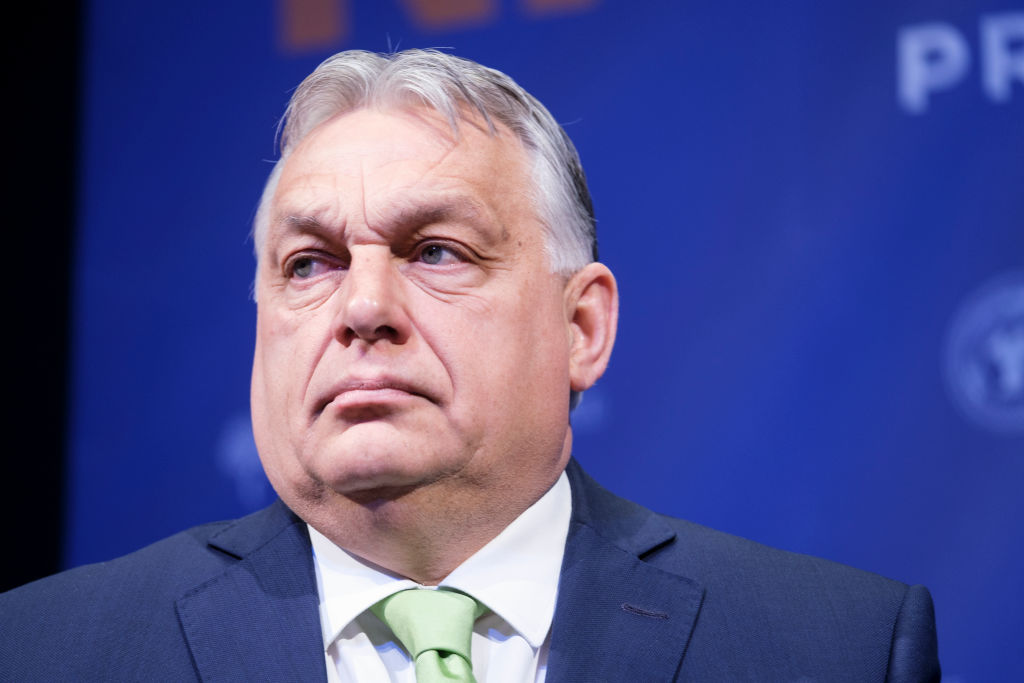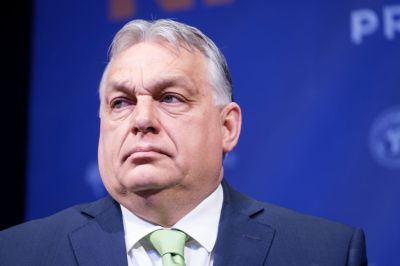When Hungarian Prime Minister Viktor Orbán visited Washington, D.C., last month, he didn’t stop at the White House or the Capitol. Instead, he spoke at a panel discussion at the Heritage Foundation before continuing on to Mar-a-Lago to meet with former President Donald Trump.
“There’s nobody that’s better, smarter, or a better leader than Viktor Orbán,” Trump said later. “He’s fantastic.” Many among the New Right regard Orbán a hero of the West or a model for conservative governance. In fact, the Conservative Political Action Committee last week held its third conference in Hungary, and Orbán was the keynote speaker.
But others—including President Joe Biden, who says Orbán is “looking for dictatorship”—criticize Orbán and consider him a friend of autocrats. And European leaders have been frustrated by his handling of the war in Ukraine.
Why has Orbán become so polarizing? It’s not just a left-right issue. Orbán is darling of the New Right for his pro-family stance and restrictionist views on immigration. While he’s faced criticism for creeping authoritarianism—he’s methodically consolidated power over courts, media, and educational institutions—Hungarians enjoy basic civil rights. But his ties with Iran, China, and Russia concern many across the political spectrum.
Every year, Freedom House, a U.S.-based nonprofit focused on democracy promotion, rates the status of freedom and democracy around the world. The spectrum of political freedom spans from perfect democracy to consolidated autocracy. Freedom House scores the U.S. at 83 (out of 100)—the United Kingdom scores 91, and France sits at 89. Freedom House currently gives Hungary a 65 on its Global Freedom Scale. That is comparable to India (66) and slightly ahead of Mexico (60). But in 2005, it scored a 92.
“Hungary’s democratic standing is quite unique in the region due to the dramatic and unprecedented democratic decline it has undergone over the last decade and more,” Mike Smeltzer, senior research analyst at Freedom House, told The Dispatch. “Whereas other ‘hybrid regimes’ in the region like Ukraine, Moldova, or Kosovo have continued to do the difficult work to establish liberal democratic institutions and norms while facing foreign threats to their domestic security and state sovereignty, Hungary’s government has moved in a uniformly illiberal and antidemocratic direction.”
How Orbán came to power.
When Orbán first entered the political arena in 1989, Hungary looked like a consolidated democracy—a state that had reached the end of its democratization process and in which democratic institutions and civil society stood strong—which rarely backslide. Orbán, then just 25, gave a speech in Budapest to commemorate the 1956 Hungarian uprising in which he decried the Soviet Red Army, demanding it withdraw and leave Hungary to enjoy free and open elections.
In 1998, the Fidesz Party, mostly anti-communist university students, won enough parliamentary seats to oust the socialist government. Orbán became the youngest prime minister in Europe. With Orbán at the helm, Hungary joined NATO in 1999 and the European Union in 2003.
Conservatives in the U.S. heralded Orbán as a harbinger of freedom and democracy. In a 2001 speech hosted by the American Enterprise Institute, Orbán lauded American freedom and pushed for NATO expansion. “In Hungary we have not grown so accustomed to the enjoyment of our freedom that we yet take it for granted; nor have we grown blasé about its charms,” Orbán told the crowd. “Its systematic and often brutal suppression is too fresh in our recollections for that to occur.”
Taking institutional control.
Orbán lost power in 2002, when Hungary’s socialist party narrowly won that year’s elections, ushering in a more polarized period. But in 2010, after an economic downturn, Orbán and Fidesz won two-thirds of the seats in Parliament, and “entrenched an incumbent advantage through new electoral law,” Dalibor Rohac, senior fellow at AEI, told The Dispatch.
Since regaining power, Orbán and Fidesz have passed a series of electoral reforms and introduced a new state constitution, reducing the number of parliamentary seats. Critics of district maps allege they were drawn to benefit the incumbent party. Fidesz has maintained a majority in parliament since these changes, though local elections are increasingly competitive.
Orbán also developed a new court system with hand-picked judges responsible for hearing cases on local government and electoral issues. In December 2022, the European Commission froze funds earmarked for Hungary pending reforms. In December 2023, the commission ruled that Hungary had taken adequate steps toward judicial independence and unlocked nearly 10.2 billion euros in available reimbursements. About 6 billion euros remain frozen by the commission for other pending concerns, such as academic freedom and asylum policy.
Orbán and his allies purged the civil service of dissenting voices at the same time he progressively took over the media market, revoking operating licenses from radio and newspapers operations critical of the party. Today, more than 80 percent of the media is owned by businessmen with ties to Orbán and the Fidesz Party.
In 2021 journalists and advocacy groups discovered that the Hungarian government was using Pegasus—an Israeli-developed spyware—to spy on citizens, including journalists and lawyers. The government justified it as necessary for national security purposes, and lawfully utilized.
Through Orbán’s consolidation of power, Rohac explained, it would be “hard to imagine a successful challenge against Orbán in the ballot box.”
A restrictionist immigration policy.
During the 2015 immigration crisis in the EU, Orbán “intuitively understood the problem of uncontrolled migration,” Rohac told The Dispatch.While the EU scrambled to accommodate droves of migrants, mostly from Syria, Hungary scrambled to close its borders.
At the height of the crisis in September and October 2015, as many as 7,000 people a day crossed illegally into Hungary, the country reported. Hungary had 1,770 applicants for asylum per 100,000 Hungarians—the highest rate in Europe. By comparison, Germany had 540 applicants per 100,000 citizens, and the U.K. had 60. This wave of migration was also unique in that the majority of those seeking asylum were young and male, atypical for asylum cases.
In response, Hungary shut down its borders and restricted the movement of migrants already inside Hungary. It also built a fence along its border with Serbia—where most migrants were crossing—and began a controversial practice of refoulement, in which migrants who had entered Hungary illegally and were apprehended within 8 kilometers of the border were moved back outside the border fence.
“I am the only politician in the EU who stands for an openly anti-immigration policy,” Orbán told reporters in 2022. “This is not a race issue for us, this is a cultural issue.”
Hungary passed a series of immigration reforms that took effect this year. The reforms delineate between highly skilled and low-skilled visas for their residence permits and bar family members from joining third-country migrant workers in Hungary. The reforms also require immigrants in Hungary on a work-related visa who are fired from their jobs to leave the country within six days.
Family and social policy
The New Right in the United States also lauds Orbán as a protector of Christian values in Europe. In his speech at the 2022 CPAC conference in Dallas he focused on immigration, crackdowns on “leftist” institutions, and crime. He also touted his country's protection of marriage and family, calling family policy “the heart of our politics.”
The constitution Orbán’s Fidesz Party enacted in 2012 asserts that Hungary “shall protect the institution of marriage as the union of a man and a woman.” Same-sex marriage is banned in Hungary, but registered partnerships are legal. Registered partners enjoy similar rights to those in a legal marriage, but they can not adopt children as partners or take a new surname. Transgender individuals in Hungary do not have an avenue to change their legal gender.
A 2021 child protection law pushed by Fidesz restricts underage access to books, movies, or other media that “promote or portray deviation from identity aligning with sex at birth, gender reassignment, or homosexuality.”
Hungary has had some success with pro-natalist policies. Orbán aims for Hungary to reach 2.1 births per woman—the replacement rate necessary to maintain the population without relying on immigration—by 2030. Since 2010, the birth rate in Hungary has risen from 1.33 to 1.55 births per woman. Earlier this year, Hungary eliminated its income tax for women who have children during their 20s—women who have four or more children are already exempt from income taxes for life.
The government also closely regulates abortion. Article II of the constitution’s Inalienable Rights section states, “Human dignity shall be inviolable … the life of the foetus shall be protected from the moment of conception.” In response, the government banned abortion via drugs. However, surgical abortions are permitted in Hungary until the 12th week of pregnancy for any reason, and in subsequent weeks in special circumstances (in the case of an unviable pregnancy, or if the life and health of the mother are at risk). Women seeking an abortion are required to attend two separate meetings with state services to inform them of their alternative options—such as adoption—and the risks of the abortion procedures. In 2022, a new law required those seeking an abortion to listen to the fetal heartbeat prior to the procedure.
Friendly relations with autocrats.
Despite being a member of the EU and NATO, Hungary maintains close ties not only with Russia, but also Iran and China.
Orbán continues to meet with Vladimir Putin amid the ongoing war in Ukraine. Hungary is the biggest customer for Russian energy, and Russia is in the process of building a new nuclear power plant in Hungary. Though Orbán will not allow weapons transfers to Ukraine through Hungary, he has supported EU sanctions against Russia.
Hungary’s foreign minister visited Tehran in February, where Iran and Hungary signed a trade deal that centers on agriculture and the food industry, two sectors that are not affected by international sanctions.
China, meanwhile, is the largest foreign investor in Hungary. China’s Belt and Road Initiative (BRI) is a 10-year-old project in which China invests massive amounts of money in infrastructure loans in growing economies. Poland, Ukraine, and Italy, as well as other former Soviet states, are also participants. But Orbán was the only European leader to attend the BRI forum last year. And Budapest is even playing host to Huawei’s largest logistics and manufacturing base outside of China. Huawei is banned in the U.S. and other countries over concerns of spying by the Chinese government.
Hungary today.
While NatCons in the U.S. hold up Orbán as a model for conservative governance, he’s facing criticism at home. Protesters organized in Budapest last month demanding Orbán resign over allegations he attempted to interfere with a corruption case involving an ally of his who served in the government.
While protests are indicative of dissent, they have not been met with violent suppression as one would expect in a consolidated autocracy. For all that Orbán has chipped away at institutions, democratic backsliding in Hungary is concerning but incomplete.
“Dissent still exists within Hungary,” Smeltzer, the Freedom House analyst, told The Dispatch. “We saw mass protests surrounding a child abuse scandal that came to light. And those protests did lead to the resignation of the president and other high-ranking figures in the ruling party. In that sense, Hungarians still maintain some of their civic rights, unlike in closed authoritarian regimes like Russia or China.”






Please note that we at The Dispatch hold ourselves, our work, and our commenters to a higher standard than other places on the internet. We welcome comments that foster genuine debate or discussion—including comments critical of us or our work—but responses that include ad hominem attacks on fellow Dispatch members or are intended to stoke fear and anger may be moderated.
With your membership, you only have the ability to comment on The Morning Dispatch articles. Consider upgrading to join the conversation everywhere.